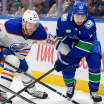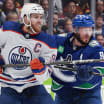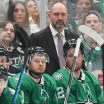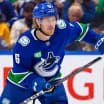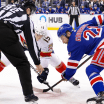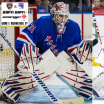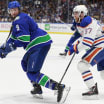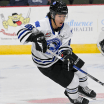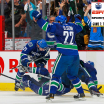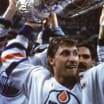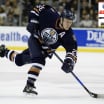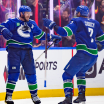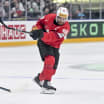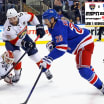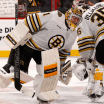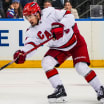In NHL.com's Q&A feature called "Sitting Down with …" we talk to key figures in the game, gaining insight into their lives on and off the ice. In this special offseason edition, we feature Ottawa Senators coach D.J. Smith.
Smith talks additions, Senators playoff chances in Q&A with NHL.com
Coach also discusses emergence of Tkachuk, Stutzle, importance of fast start
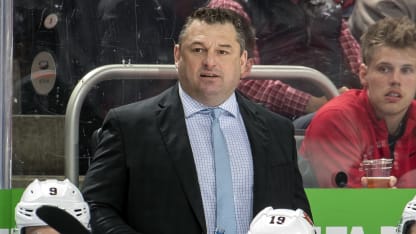
© Dave Reginek/Getty Images
D.J. Smith can't wait for the start of training camp heading into his third season as coach of the Ottawa Senators.
"I guess I'm going to use the coming-of-age of a lot of players that have been through some tough times," he said. "A lot of guys were put in spots maybe a little earlier than we had thought because of injuries and because of that we lost some games.
"But because of that, guys are probably a little ahead of maybe where they'd be and I think they're at the age now where they're starting to be not only good players, in our eyes, but good players in the eyes of the League. Now it's up to us to prove it."
The Senators (33-42-7) finished seventh in the Atlantic Division last season, 27 points behind the Washington Capitals for the second wild card into the Stanley Cup Playoffs from the Eastern Conference. They have not qualified for the postseason since 2017.
Ottawa was aggressive in free agency and on the trade front this offseason and has raised expectations within the organization and among their fanbase.
The biggest additions were made up front, with proven point-producers Claude Giroux (three-year contract) and Alex DeBrincat (acquired from Chicago Blackhawks). The two join a talented group of forwards that features captain Brady Tkachuk,
Tim Stutzle
, Josh Norris and Drake Batherson.
NHL.com caught up with Smith at the Prospects Challenge in Buffalo on Sept. 17. He discussed the upgrades and his optimism, goaltending and defense, Tkachuk, lessons learned from Mike Babcock, and more.
Has general manager Pierre Dorion done enough to help the Senators qualify for the Stanley Cup Playoffs?
"That's a hard one to answer. I don't know if all 16 teams in the Eastern Conference think they're going to get in but probably 13 think they got a chance. A lot of teams did a lot of things this summer to improve, but forward Alex DeBrincat may be the best player of the whole group to switch hands and give us a real bona fide scorer. And then, bringing in Claude Giroux certainly helps us with leadership, face-offs. He's a player who instantly can play and he's got a lot to prove coming home (from Hearst, Ontario). If we're healthy, we're a much better team up front but the question is, if we can stay healthy, how is our goaltending, our defense, our team play? All those things got to go together, so everyone's pushing for a spot. So, to say that we think we're going to be there ... I'll say we're going to try and be there."
Ottawa Senators offseason
How important is getting off to a quick start and maintaining pace with the elite of the Atlantic Division?
"That's something that's been talked about. Whatever excuse you want to use. In our first year, we can use that there was no goaltender. In my second year, last year, we got decimated by COVID-19. It is what it is, things happen in hockey, but you have to react. We could run into some injuries, so we have got to be ready to go and we're not sneaking up on anybody. We just got to worry about the Ottawa Senators and get down to business right away."
Do you need more consistency from your goalies in order to challenge for a playoff spot?
"Well, I love what Anton Forsberg did for us last year (22-17-4, 2.82 goals-against average, .917 save percentage). In my mind, he showed not only the League, but showed himself what he's capable of and I have the utmost trust in him and so do our players. There were nights where we had a lot of injuries and hit with COVID, and Forsberg was the absolute reason we won the game. I think he believes in himself, and we believe in him. Then, obviously, I think Dorion
fulltime. Can Erik Brannstrom take another step? Can some of the guys that were hurt last year be healthy and have bounce-back years? So I think we have a lot of experience on the back end but we just got to prove it now. I think we should have the puck more, which is going to help. It's easy to blame the defense, but if you don't have the puck, and for most of the season our centers were hurt, that doesn't help. I think we're going to be much stronger down the middle and that's going to help our defense as a whole. There's a lot of unknowns back there, guys are fighting for jobs, but I think it's going to be healthy competition. It's going to make our team better."
Tim Stutzle seems to be coming into his own as an NHL player and he showed growth when he stepped in at center because of all the injuries last year. What have you learned about him the past two seasons?
"The thing for Tim, he wasn't sold on playing center right away. I think he just wanted to learn the League, and rightfully so. He was a fresh rookie when there were a lot of guys still playing junior hockey. But with all the injuries we had it provided him a stress-free environment to do so, and he excelled. He likes the ice time, he likes to skate, he's super competitive. But again, where I see the maturity for him is off the ice. He understands how hard the League is, he understands what practice means. He understands what sleep, rest and nutrition is all about. It's easy to think you know that coming here, but there's no other league like this one and you've got to play in it to be able to learn it. You're going to make mistakes along the way, but it's hard not to be excited watching a guy like Timmy play. The excitement he has for the game, his willingness to go to tough areas, his willingness to do all those things. He's going to be a good player for a long time."
You spent four seasons as an assistant coach to Mike Babcock with the Toronto Maple Leafs prior to getting the job in Ottawa in May 2019. What did you learn from him?
"I think probably the best thing I've taken, and I've taken lots, is that he just grinds and works and prepares. His practices are really good. If you talk to anyone with Mike, players like his practices. They're fast. No one wants to be sitting around doing nothing. It's sharp, but I think the best thing I learned from Mike was steady on the rudder. The NHL is so like that. You may lose two, you may win two, you may win five, but just do what you do over and over and don't change your approach. I think that as you evolve as a coach that's something that's invaluable. Don't be too high, don't be too low, but just keep doing what you're doing. The noise on the outside can sometimes affect that but you got to believe in what you believe in and just stick with it."
